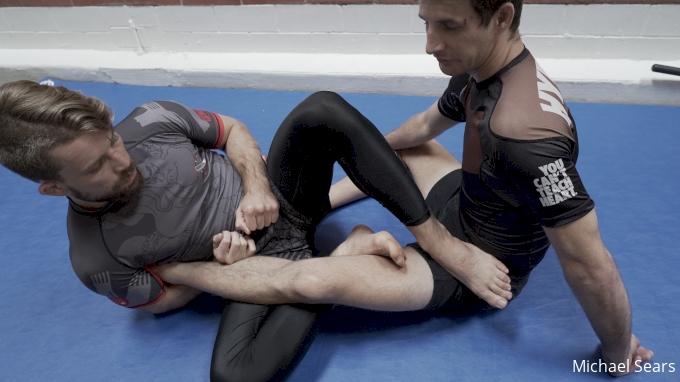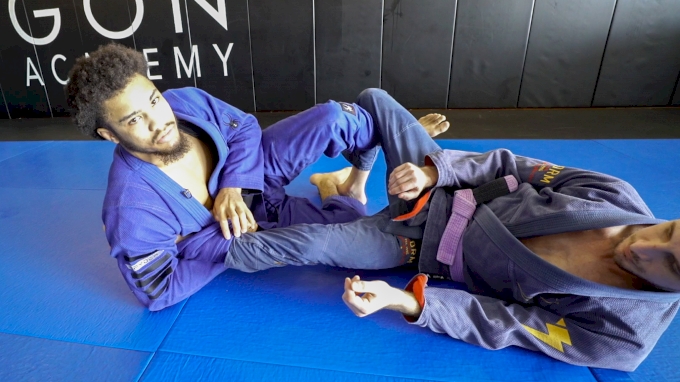Secrets of Elite Footlockers: Mikey, Isaac & More | Technique Showcase
Secrets of Elite Footlockers: Mikey, Isaac & More | Technique Showcase
A few athletes are, without a doubt, the exemplars of the straight footlock system in the gi. It starts with the butterfly ashi.

Unlock this article, live events, and more with a subscription!
Already a subscriber? Log In
With all the buzz around heel hooks and the focus on no-gi oriented leglocks, it’s easy to forget how powerful the straight ankle lock can be. The footlock is more than a way to earn the favor of the judges or score an advantage in a close match. When applied correctly, it’s a powerful submission responsible for some of the most brutal-looking breaks in jiu-jitsu.
A few athletes are, without a doubt, the exemplars of the straight footlock system in the gi. Each of them applies their own nuances. However, all of these athletes use the same core concepts in their footlock mechanics, and they’re able to execute them on the biggest stages.
It starts with the position.
The Butterfly Ashi
The best modern gi footlockers commonly use attack from a variation of the traditional straight ankle lock position. In traditional ashi garami, or single leg X-guard, the attacker hooks his inside foot between the defenders’ legs and posts his outside foot on the defenders’ hips. Competitors such as Mikey Musumeci, Isaac Doederlein and Bianca Basilio often use a hybrid position called butterfly ashi. In this position, the attacker hooks their outside foot behind the opponent’s leg, wedging in the hip joint like a de la riva guard, and posts the sole of the inside foot on the same hip.

For an overview of every leg entanglement, check out the Official FloGrappling Leg Entanglement Encyclopedia
Attackers in this position sacrifice some control of the free leg in order to reinforce their control of the leg under attack. Because the attacker has two points of contact on one hip, he or she can manage distance even if the defender removes one post.
In this clip, watch how Musumeci Uses the position of his right hook to keep distance, eventually making space for his left foot to join in the attack.
Watch: Mikey Musumeci’s Systematic Butterfly Ashi Setup

In addition to his two foot posts, Musumeci often uses his free hand to grab the defender’s pants below the knee of the target leg. This gives him yet another layer of distance control. It also reduces the defender’s ability to straighten his leg to alleviate pressure.
The butterfly ashi position also makes it simple for the attacker to switch between legs. Because both of the attacker’s feet are inside the defender’s legs, the attacker needs only to pummel one knee out and the other one in in order to switch targets. Here’s a clean example of this:
Watch: Mikey Musumeci Transitions Between Legs To Finish The Footlock

Musumeci is one of the best in the world from this position. He is the record holder for quickest submission in an IBJJF World Championships final. He won his 2019 final in 12 seconds with a footlock from butterfly ashi. Check out our highlight of his best footlock finishes below.
Highlight: Mikey Musumeci Has Some Of The Quickest Footlock Wins Ever

Keeping The Leg Weightless
Like Musumeci, Isaac Doederlein has a powerful footlock from butterfly ashi. But Doederlein's approach highlights details in dealing with a standing opponent.
Musumeci generally enters the position when both competitors are seated, and switches to a different attack if his opponent stands up. Doederlein, on the other hand, continues to pursue the footlock even as his opponent stands.
As the defender stands, Doederlein focuses on keeping the attacked leg light. If the defender can put weight on the trapped leg, he can begin removing posts. To combat this, Doederlein often grabs the defender’s free leg.
In this clip, the defender stands up and Doederlein immediately makes a grip on the defender’s free leg near the knee. With the grip, Doederlein can keep the defender’s legs separated so he can’t drop his weight onto his foot.
When the defender leans forward to try to force his foot to the mat, Doederlein extends the defender forward overhead, taking all of the weight out of the defender’s legs and using this opportunity to get a finishing grip on the foot.
Watch: Isaac Doederlein Controls His Opponent’s Far Leg To Finish The Footlock

The High Elbow Finish
Doederlein has a unique way of finishing his footlock. He often looks to finish when the defender’s trapped leg is on top of their free leg. From this position, his back is nearly flat on the mat, so he doesn’t have much range to bridge his back against the foot. Instead, he keeps the target foot elevated against his ribs. Rather than pulling his elbow back, he punches it forward, and bridges his lat against the inside of his opponent’s foot. While doing this, Doederlein bridges his hips, and posts his free hand on his knee, maximizing extension.
The pressure is not the same as a traditional straight foot lock. Instead, it resembles an inside heel hook or an Aoki lock.
Watch: Isaac Doederlein Applies A Unique Angle In His Footlock Finish

Doederlein has a vast collection of high profile footlock finishes, one of which was nominated as 2020 Submission Of The Year. Watch his footlock highlight here.
Highlight: Four Footlock Finishes From Isaac Doederlein

The Belly-Down Footlock
Another benefit of the butterfly ashi is the ease with which the attacker can transition from a standard footlock to a belly-down attack. Because the attacker’s outside foot hooks on the inside of the defender’s leg, it doesn’t get in the way as the attacker rolls to face the mat.
The foot placement in the butterfly ashi also makes it easy for the attacker to bend the defender’s leg when applying the belly down footlock. This bend allows the attacker to take control of the defender’s shin, eliminating the defender’s ability to move their leg in the attack.
Bianca Basilio has one of the most vicious belly-down footlocks of any competitor today. Watch the details in her highlight below. In some instances, she posts on her head and elongates her spine for the finish. On other instances, she posts on her hand and arches her back. Regardless, her belly-down footlock frequently results in a scream tap.
Highlight: Bianca Basilio's Belly Down Footlock Is Scary

Fellipe Andrew’s footlock is different from those of the other athletes on this list in a few key ways. First, Andrew doesn’t appear to initiate this attack as a primary component of his offense. On most occasions, he uses it as a counter to a toe hold, or even a backtake. Second, Andrew doesn’t seem to have a particular favor for butterfly ashi, as he’s often successful from standard ashi and even outside ashi. Lastly, once Andrew has a bite on his footlock, he will continue to pursue it regardless of the risk. He’ll chase the finish as his opponent is fighting to pass his guard, applying a toe hold, or even settling onto his back.
But that’s exactly what makes Andrew’s footlock so tight. Andrew allows his opponents to put themselves out of position. When they overextend, he collects their foot with a precise bite. Because his initial grip is always nearly perfect, he can use it as both an attack and a measure of keeping his opponent from advancing.
Check out the highlight of his high-risk footlock game below.
Highlight: Fellipe Andrew Will Risk Everything For The Footlock Finish

More Resources
Want more details about the many variations of the straight ankle lock? Follow the links below for lessons from world champions including Mikey, Shane Jamil Hill-Taylor, Braulio Estima and more.

Mikey Explains His Record-Breaking Ankle Lock
Jamil Hill-Taylor's Worm X-Guard Ankle Lock
Tomoyuki Hashimoto Teaches The Footlock From De La Riva
Masterclass: The Caio Terra Ankle Lock
Braulio Estima's Straight Ankle Lock
Bianca Basilio, Queen Of The Footlock | Baleia's Breakdown (Ep. 18)
Do Ankle Locks Work? | Saturday Match Rewind (Ep. 23)
Are Leglocks Fundamental Submissions? | Ask Xande